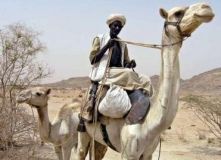East Sudan rebels agree to talks with conditions
By Opheera McDoom
KHARTOUM, June 29 (Reuters) – East Sudan’s rebels and opposition parties will hold talks with the government if it releases prisoners and publishes an investigation into police shootings in January, a rebel leader said on Wednesday.

|
|
A Beja man rides his camel in the rebel-controlled area of Eastern Sudan, near the border with Eritrea in this picture taken June 4, 2005. (Reuters). |
Amna Dirar, head of the main eastern opposition party, the Beja Congress, said the government must address the needs of the neglected east, which has seen a recent flare-up of fighting.
“Yes we are ready (for talks), but we have two conditions: release all the detainees and publish a result of the investigation into Port Sudan,” Dirar told Reuters in Khartoum.
In January police opened fire on a march in Port Sudan and then rampaged through people’s homes, killing at least 20 and wounding dozens of others. The committee formed to investigate the killings has yet to publish any findings and more than a dozen people were still in detention after the march.
Fighting broke out last week between rebels and Sudanese government soldiers in the east. Rebels said Khartoum retaliated with aerial bombings, but there was no independent confirmation.
The government has agreed to hold talks with eastern rebels, who it says are backed by Eritrea. But Khartoum does not want international mediation, whereas Dirar called for talks in another African country.
Eastern rebels last month kidnapped three local politicians and abducted 20 soldiers during last week’s fighting. Dirar said they were being held along the Eritrean border and rebel military leaders had assured her they would not be harmed.
The eastern Beja tribes have long complained of neglect in their area, one of the most important economic areas in Sudan. The east contains Sudan’s only port, Port Sudan, the main oil pipeline which carries Sudanese crude exports and Sudan’s largest gold mine.
Yet the people remain among the poorest in the country. Dirar said successive democratic and military governments in Sudan had all kept the east underdeveloped and uneducated to control the economic interests there.
“Only 5 percent of those of school age are at school and less than 1 percent of those who should be at university level are at university,” she said.
The U.N. World Food Programme has said malnutrition rates in the east were higher than in parts of the war-ravaged south and Darfur in the west, where aid agencies focus their work.
Dirar said the armed elements in the east were recently reinforced by Darfur rebels. The Eastern Front, formed earlier this year, is a joint force from the military wing of the Beja Congress and another group called the Rashaida Free Lions.
“We have the same objectives but we have different kinds of methods,” Dirar said of the military wing of the Beja Congress. “Their method we don’t think it is the right method, but within the current environment unfortunately the only method known is using arms,” she said.
She said she hoped a peace deal signed in January ending more than two decades of civil war in Sudan’s south would help expedite talks in the east.
The former southern rebels, who used to fight alongside eastern fighters, will form a coalition government in Khartoum on July 9.
